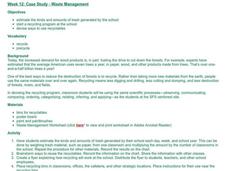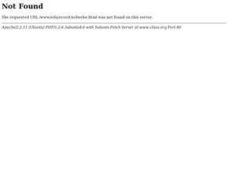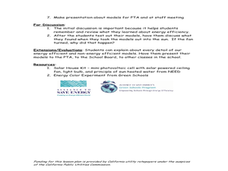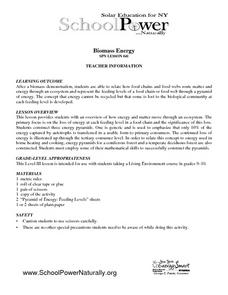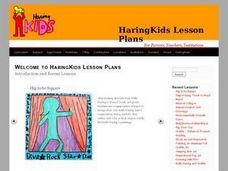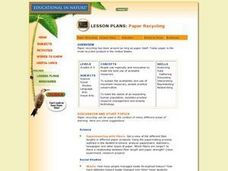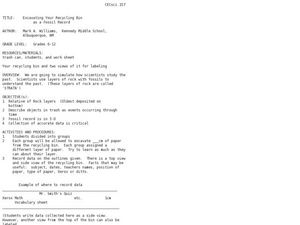Curated OER
Waste Management
Students set up a recycling program in their school. They first estimate the kinds and amount of trash generated and brainstorm ways to reuse the recyclables and create flyers explaining how their program will work at the school.
Curated OER
Aluminum Altruism
Students explore the value of recycling. They consider the importance of giving back to their school community. They calculate their earnings using multiplication and addition.
Curated OER
Compost Columns
In this unit of lessons, young scholars examine the role of compost columns and recycling. They create a KWL chart about garbage in Chicago. They also examine life cycles and packaging of everyday products.
Curated OER
Christmas Potpourri Hangers
Students create a potpourri hanger. In this Christmas craft lesson, students reuse materials to make a Christmas potpourri hangar for the tree or for a gift.
Curated OER
Add and Subtract Fractions with Like Denominators: 2 (Word Problems)
For this fraction worksheet, fourth and fifth graders solve six word problems, all having to do with adding or subtracting fractions with like denominators. This worksheet can be adapted to the Common Core standards in math.
Curated OER
The Water We Drink
Third graders relate that the quality of their drinking water is subject to the condition of the environment and water found in streams and creeks in their community. They track the travel of a wad of paper from a student's desk to a...
Curated OER
Crafting Models of Efficiency
Students build and compare models of both an energy inefficient and efficient classroom. In this energy efficiency lesson, students creatively use recycled materials to build two separate classroom models. They factor in concepts such as...
Nuffield Foundation
Microbes Ate My Homework
Now you have a new excuse not to do your homework. A long-term experiment has learners explore cellulose-digesting enzymes. They simulate how paper breaks down in a compost bin. There's no need to blame your dog for eating your homework...
Curated OER
Our Natural Resources
Your class will learn about natural resources and man-made items and differentiate between them. They chart resources from seven pictures and explain how each natural resource is used.
DiscoverE
Build a Pinball Game
Watch your classroom turn into an arcade. Pupils work in groups to build pinball machines from boxes and other found objects. Gamers must incorporate a variety of obstacles and launchers into the machine to see their designs in motion.
Curated OER
Dinnertime for Animals
Is a deer an herbivore? What about a spider? Experiment with the food chain in an interactive science experiment. After listing the herbivores from a selection of animals, third and fourth graders compare the skulls and teeth of...
Wild BC
Bearly Any Ice
After reviewing food chains, your class members participate in an arctic predator-prey game that exemplifies the impact of climate change of food availability. If you are in a hurry, skip this lesson, but if you have the time to...
Curated OER
Biomass Energy
Junior ecologists relate how food chains and food webs route matter and energy through an ecosystem. They trace feeding levels of a food chain or food web through a pyramid of energy. As a reinforcement activity, learners construct three...
New Class Museum
Lesson: Emory Douglas: Decoding Images and Vocabulary Activity
To better understand the work of Black Panther logo artist Emory Douglas, learners define literary devices. They define a series of words such as metaphor, simile, and assonance, then place an example of that device found in Emory...
Curated OER
Lesson: Urs Fischer: Reviving the Past Art Movements
Seven major abstract art movements are analyzed by learners in groups. Each group analyzes various works by determining which work belongs to which movement. They then read Flatland, engage in an art and literary analysis discussion,...
Alabama Learning Exchange
Good Litter, Bad Litter
Which ones can be thrown on the ground? Discover the difference between natural litter and unhealthy trash, helping scholars by using several examples. Use the information here to give them a basic background, but also encourage prior...
Curated OER
Garbage Routes
Students brainstorm a list of places where garbage is disposed. Working in groups, they discover through a classroom simulation how garbage can wither be recycled or hauled to a landfill. they complete the activity with a worksheet on...
Curated OER
Mixing Up Magic
Pupils explore the relationship between art and science through experimenting with color, design and recycled materials and creating their own art work.
Curated OER
MY REDUCE/REUSE STORY
Students go through old magazines and select pictures of things which ultimately become a waste product. They paste these pictures into a small "recycling" book. They dictate a story about reuse and/or recycling of these materials.
Curated OER
Stage 1: What is Going into the Bin?
Student can explain the difference between biodegradable and non-biodegradable. They calculate how much rubbish bags all their families together produce each week and then calculate how much rubbish their families produce during the...
Curated OER
All Wrapped Up
Students work in teams to identify and sort types of packaging used in food production. They consider ways to reduce the environmental impact of packaging and reflect how consumer choices play a role in trash production.
Curated OER
Preparation -- The Right Way to Help and FOrm for Poetic Reflection
Students prepare for their service learning project by listening to a representative from the Lake Michigan Federation. They volunteer their time to clean up the coast line. They reflect on the event by writing a poem about their...
Curated OER
PAPER RECYCLING
Learners examine the availability and use of important resources, people practice conservation. They explore the needs of an expanding human population, societies practice resource management and employ technology.
Curated OER
Excavating Your Recycling Bin as a Fossil Record
Students explore how scientists examine the past and use rock layers with fossils to understand the past. In this excavation lesson students divide into groups and complete an activity.


